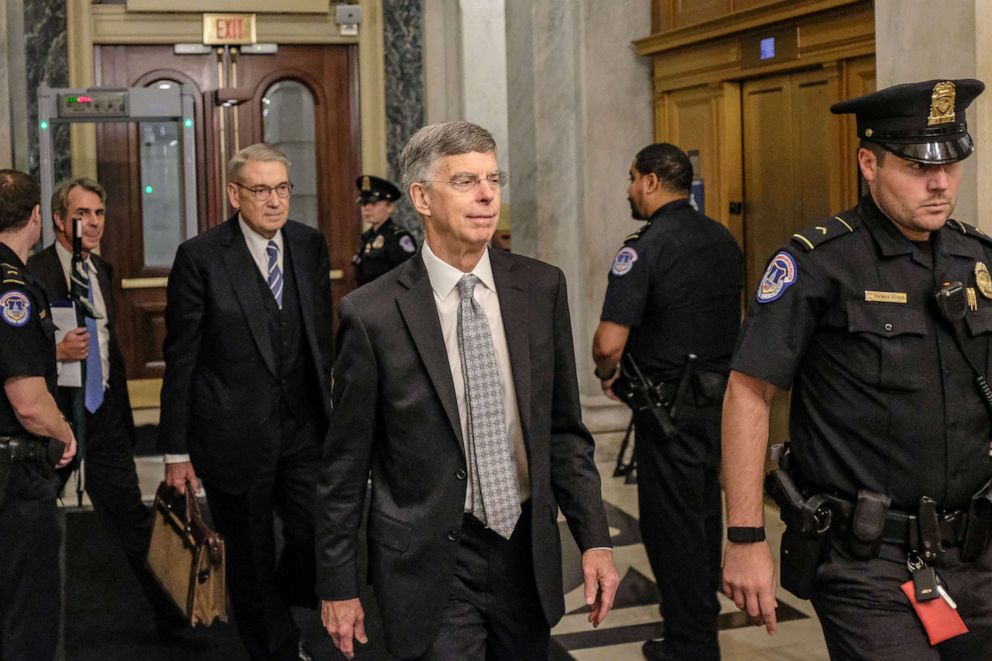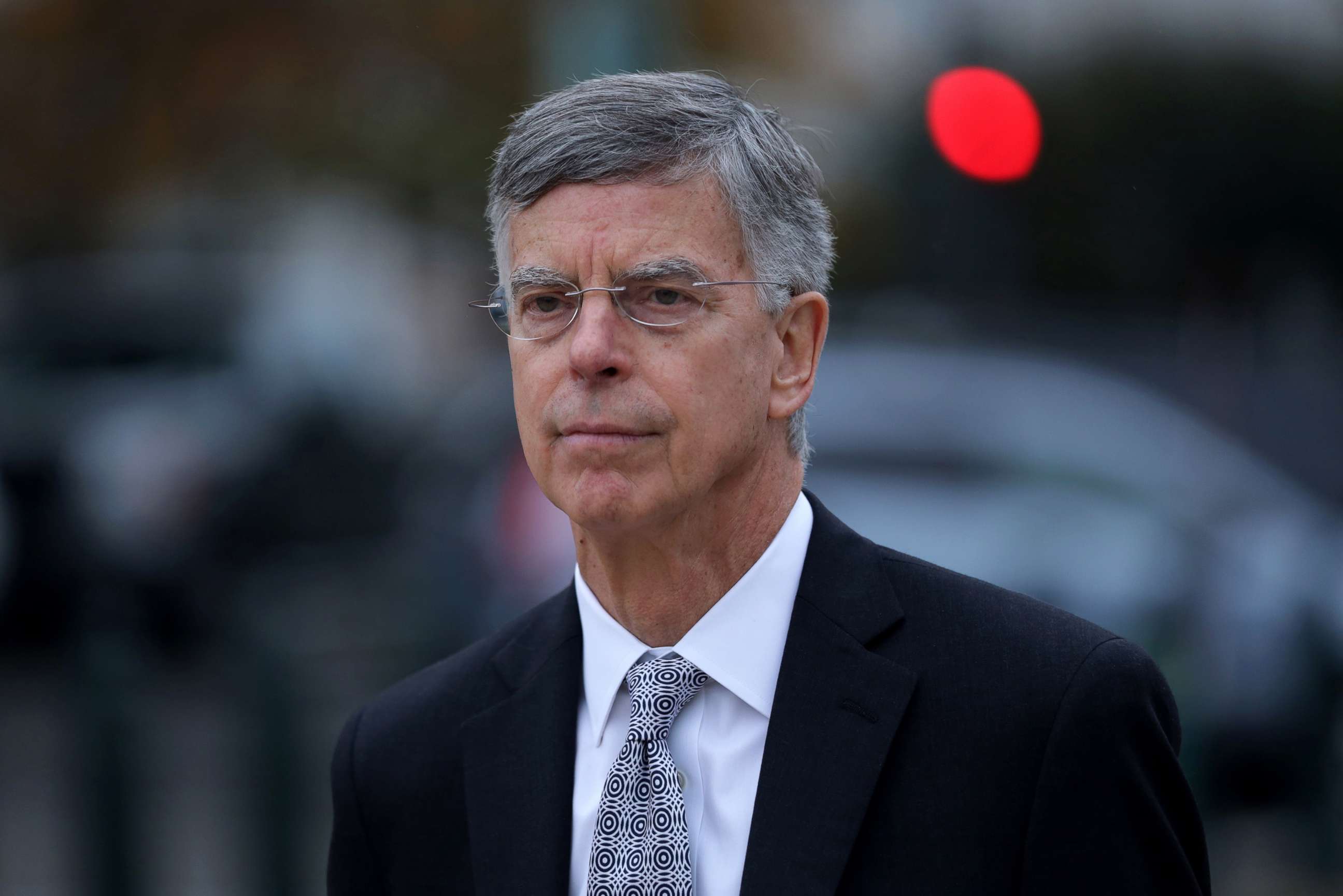New testimony on Ukraine could be a game changer. Here's why.
Taylor told Congress he was told of a quid pro quo.
Bill Taylor, the top U.S. diplomat in Ukraine, has emerged as a cudgel in the Democrats’ impeachment inquiry. In explosive new testimony, the longtime foreign service officer provided lawmakers with painstaking details on how he came to suspect the White House was withholding aid unless Ukraine agreed to launch an investigation aimed at President Donald Trump’s political rival, Joe Biden.
It was, as he put it, "a weird combination of encouraging, confusing and ultimately alarming circumstances."
Here’s why Taylor’s testimony matters:
Taylor is not a partisan, or anonymous
A West Point graduate and Vietnam veteran, Taylor became a foreign service officer who was eventually appointed as ambassador to Ukraine in 2006 by Republican President George W. Bush.
When Taylor did seek outside advice -- last spring, he said, he hesitated to take the job because of rumors of unusual political influence -- Taylor said he turned to his wife and a longtime mentor who happens to be a former senior Republican official. (He said his wife voted against the job, but his mentor swayed him by saying he should serve his country if asked and if he believed he could be effective.)
Taylor also isn’t an unnamed source. After an unnamed whistleblower filed a complaint in August alleging misconduct by Trump, the president alleged that person was politically motivated despite a finding by the intelligence community’s inspector general that the person’s allegations were credible. (The whistleblower’s lawyers have said the person is a career intelligence officer who has advised both Democrats and Republicans.)
With it nearly impossible to dismiss Taylor as partisan, Trump is noting that Taylor hired John Bellinger as his attorney, a senior official in the Bush administration who opposed Trump’s candidacy.

Taylor alleges a firm 'quid pro quo'
In his written testimony, Taylor described learning of backchannel efforts involving Trump’s personal attorney, Rudy Giuliani, to pressure Ukraine into launching an investigation that Giuliani thought would benefit Trump.
By mid-July, Taylor said it was "becoming clear" that if Ukraine’s leader wanted to meet with Trump, he would have to agree to investigate the widely debunked theory that Ukraine, not Russia, meddled in the 2016 election, as well as probe the Ukraine gas company Burisma, that once employed Biden’s son, Hunter, as a board member.
Around the same time, Taylor said he learned in a staff meeting that the president himself had ordered a hold on nearly $400 million in U.S. aid for Ukraine. By Sept. 1, Taylor said he was told by Gordon Sondland -- a Trump megadonor and hotelier who was appointed by the president to become the top U.S. ambassador to the European Union -- that "everything" was contingent upon Ukraine launching an investigation, including the military aid.
Taylor testimony pushes back on Trump’s suggestion Ukraine was in the dark
Trump and his close allies suggested on Wednesday that a quid pro quo wasn’t possible because Ukraine didn’t know about the hold up of aid.
"You can't have a quid pro quo with no quo," Trump tweeted, citing an interview Rep. John Ratcliffe, R-Texas, gave to Fox News.
According to Taylor’s testimony, Ukraine was feeling pressured as early as July 10, following a meeting at the White House with senior administration officials. Taylor said a senior Ukraine official told him that President Volodymyr Zelenskiy "did not want to be used as a pawn in U.S. re-election campaign."
By mid-August, the Ukrainians took the unusual step of asking the U.S. to submit its request for an investigation in writing. And by Aug. 29, a senior Ukrainian official reached out to Taylor expressing serious concern about the hold-up in aid money, Taylor said.
Taylor outlines in detail why he thinks Trump wasn’t acting in US interests
Another reason Taylor’s testimony is so problematic for Trump is that he outlines in painstaking detail why Trump’s decision to withhold U.S. support was not in America’s best interest.

To hear Taylor tell it, U.S. support of the new government in Ukraine fit in with America's decades-long priority of deterring Russian aggression and there was little debate among seasoned diplomats involved that the U.S. should throw its full weight behind the new government. Ukraine had taken serious, concrete steps toward tackling corruption, he testified, and desperately needed U.S. military aid to continue fighting Russian troops at its border.
"If Ukraine succeeds in breaking free of Russian influence, it is possible for Europe to be whole, free, democratic and at peace," he wrote. "In contrast, if Russia dominates Ukraine, Russia will again become an empire, oppressing its people and threatening its neighbors and the rest of the world."
Taylor put everything in writing
Taylor created a paper trail, at one point encouraged by then-national security adviser John Bolton to write down his thoughts and sent via cable to Secretary of State Mike Pompeo.
According to Taylor, he warned Pompeo specifically that "Russia was watching closely to gauge the level of American support for the Ukrainian government."
"I told the Secretary I could not and would not defend such a policy," Taylor wrote.
Taylor said he heard later Pompeo carried his letter with him into a White House meeting on military aid for Ukraine. But Pompeo, he said, never responded.




